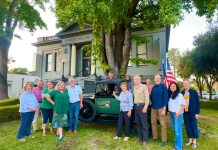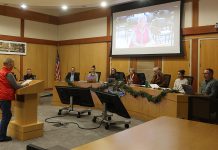How do you talk to someone who lost everything in the fire?
How do you talk to someone who lost nothing?
The key, according to Melissa Ladren and Wendy Wheelwright, two licensed marriage and family therapists with the county, is to be compassionate and listen.
“We all know someone who lost a home,” Ladren told county employees Thursday afternoon during a training designed to help county employees work with victims of the Tubbs, Nuns and Pocket fires.
“This was truly a community event,” Ladren said. “Nobody was expecting it. It was shocking.”
Ladren is right — the fires came out of nowhere during the midnight morning hours of Monday, Oct. 9. Residents of the Larkfield, Fountaingrove and Coffey Park neighborhoods had minutes to escape the flames that would eventually ravage and level the east Santa Rosa areas.
“As people, we want to be understood,” Ladren said. “It’s important to dig into your empathy and be there for an individual in need of help. Be present.”
According to Ladren, people experience shock and disaster in many ways. Some individuals may feel anxious and fearful while others are simply overwhelmed by sadness. Anger is a common emotion, as is guilt. People may feel heroic and bubbling with energy, like they can do anything, while others may feel lethargic, numb or disconnected.
Physical reactions can vary too. People who undergo a disaster or other traumatic event may have stomachaches, headaches or other physical pains. They may eat too much or too late. Other physical symptoms include sweating or chills, tremors, muscle twitches or being jump and startled. Ladren admitted she still feels jumpy every time she hears a siren.
“Everyone has a different way. There is no right way or wrong way,” she said.
With so many different reactions, those who are working with the firestorm victims may feel overwhelmed knowing how to best help.
“It’s important to validate, validate, validate,” Ladren said. “Allow them to have their feelings. Listen to them.”
Ladren and Wheelwright suggested using tools listed in the California Association of Marriage and Family Therapists psychological first aid kit:
- Make a connection
- Be kind, calm and compassionate
- Meet people’s basic needs
- Listen
- Give realistic reassurance
- Encourage good coping skills
- Help people connect
- End the conversation with referral to the next level of care
Ladren said it is especially important not to give people false hope or information, as many victims are emotionally fragile and could be easily moved if more goes wrong.
“We need to give people realistic reassurance. Saying ‘everything’s going to be fine’ doesn’t help. It’s not fine,” Ladren said.
Having a calm demeanor will also go a long way in helping and connecting with victims, especially if they are angry, violent or scared, Wheelwright said.
“I need to sound calm so hopefully they’ll simmer down with me,” Wheelwright said.
Calmness will also help children who have been affected by the fires. According to the National Association of School Psychologists (NASP), children look up to adults for guidance on how to manage their reactions once the immediate threat has passed. Just like adults, children’s reactions will vary. The NASP reports that children’s severity of reactions will depend on factors like exposure to the wildfire, personal loss or injury of a loved one, relocated from their home or community, level of parent support, level of physical destruction and any pre-existing conditions, such as previous traumatic experience or mental illness.
Ladren, on behalf of the Sonoma County Department of Health Services Behavioral Health Division, suggest giving preschool children extra verbal support and cuddling, speaking to them on their level in a calm voice with simple language and assuring them of their safety and care.
Older children need to be nurtured, too. Because they are more mature, children between the ages of 6 and 19 can better express their emotions. As such, it can be helpful for their healing process to get back into regular routines, encourage writing or drawing, spending time with friends and engaging in special activities with them.
Children may need extra guidance if their family also lost a pet in the fire, Ladren said. Often times, the loss of a pet is a child’s first encounter with death. Rather than skirt around the topic, experts suggest explaining a pet’s death in a clear, respectful manner.
For those seeking extra help coping and grieving or for those who may be in crisis, the county provides many services.
Suicide prevention services
- Call 911
- Mental Health Crisis Services: 707-576-8181
- North Bay Suicide Prevent Hotline of Sonoma County: 855-587-6373
- The Friendship Line: 800-971-0016
- Sonoma County Mental Health Access Team: 707-565-6900
Sonoma County counseling services
- Brookwood Health Center: 707-303-4060
- Sonoma County Indian Health Project: 707-521-4500
- Southwest Community Heath Center: 707-547-2222
- Vista Family Health Center: 707-303-3600
- Alliance: 707-433-5494
- Alexander Valley Regional Medical Center: 707-894-4229
- Petaluma Health Center: 707-559-7500
- Occidental Area Health Center: 707-874-2444 or 707-823-1616
- Russian River Health Center: 707-869-2849
- Sebastopol Community Health Center: 707-842-9999
- Sonoma Valley Community Health Center: 707-939-6070
Low fee counseling agencies
- Chrysalis Counseling Services for Women (Santa Rosa): 707-545-1670
- Family Service Agency (Santa Rosa): 707-545-4551
- Jewish Family and Children’s Services: 707-571-8131
- Lomi Psychotherapy Clinic: 707-579-0465
- Petaluma People Services Center: 707-765-8488
- SOS Counseling Services (various locations): 707-284-3444
- Verity (Santa Rosa): 707-545-7273
Alcohol and drug services
- Drug Abuse Alternatives Center: 707-544-3295
- Sonoma County Department of Health Services Orenda Center: 707-565-7450
Peer support
- Council on Aging: 707-525-0143 ext. 125
- Family Service Agency: 707-545-4551 ext. 308
- Peer Warmline Connection of Sonoma county: 707-565-4466
- Spectrum LGBT Center: 415-472-1945
- Wellness and Advocacy Center: 707-565-7800
- Interlink Self Help Center: 707-546-4481
Family and other support
- Buckelew Programs — Support for Families: 707-571-5581
- NAMI Sonoma County: 707-527-6655
- West County Community Services: 707-869-0618
- La Luz Bilingual Center: 707-938-5131
- The Living Room: 707-579-0138
- Catholic Charities: 707-528-8712
- Redwood Gospel Mission: 707-542-4817
- YMCA: 707-546-9922
- Coffee House (for teens): 707-546-3432
- Social Advocates for Youth: 707-544-3299








